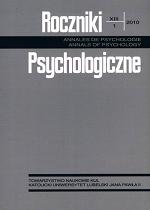
Keywords: methodology; quantitative methods; qualitative methods
This article compares and contrasts some aspects of qualitative and quantitative research approaches. The question is: how does a researcher select a research paradigm and corresponding methodology? Is this choice a consequence of the nature or essence of the social phenomena being investigated? The researcher’s thinking style is probably a key factor for the preferred choice of methods. The strengths and weaknesses of qualitative and quantitative research are a perennial and hot themes of debate, especially in psychology. Much of this debate has tended to obfuscate rather than clarify the problem, and to divide rather than unite researchers. Is this the inter-paradigm debate or is it a dispute between competing paradigms? Quantitative purists express assumptions that are consistent with positivist philosophy, whereas qualitative purists reject positivism. However, the major question remains: What is the goal of investigation? The final section of the paper advocates a “pragmatic approach” as a new guiding paradigm and as a basis for supporting work that combines qualitative and quantitative methods.
More...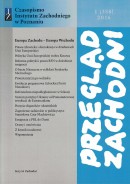
The article discusses selected aspects of the architecture in Poznań in the interwar period. Special emphasis is placed on the issue of the influence of German ideas that pervaded the works of the local architectural milieu which accepted them consciously, subconsciously or sometimes suppressed them from consciousness. On the one hand, this was due to the fact that Poznań designers were educated mostly in Berlin, Munich, Dresden or Karlsruhe. On the other hand, German ideas also proved attractive for architects who arrived from Galicia and knew them at least in theory from their education in Lvov, similarly to Viennese concepts. Among the many tendencies in the 1920s, the one that gained greatest prominence was the so-called ‘‘Um 1800’’ style codified by Paul Mebes in his famous book under the same title, but expressionistic transformations of historical, mostly modern styles, were also frequent. The 1930s were characterized by an overlapping of two discourses: functionalization of life in a great modern city and the conservation of its monuments. A significant contribution on the part of the Warsaw milieu must be noted, but business travels and knowledge of the latest textbooks pointed the attention of the Poznań architects to Poland’s closest western neighbour.
More...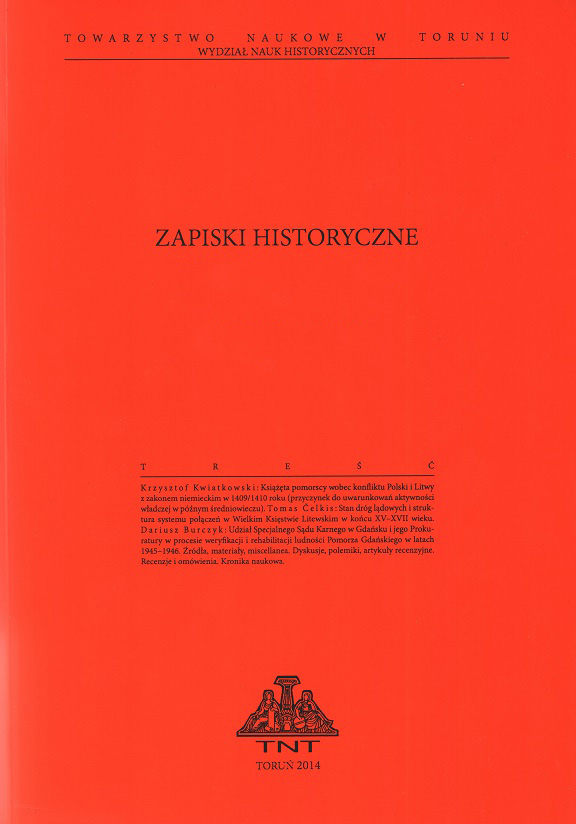
Keywords: Baltic trade in the 17th century;Gdańsk merchants;Dutch merchants;Gdańsk trade;Dutch trade;the Polish-Lithuanian noblemen;the Polish-Lithuanian aristocracy in the 17th century;
The article was based on the documents generated in the Notary Office of Amsterdam, which concerned the Polish noblemen’s residence in the Netherlands. The analysis of those documents was preceded by the description of the changes in grain trade in the 17th-18th centuries along with their consequences. The article presents the destinations of trade voyages from Gdańsk and the range of products involved in trade. The documents from the Notary Office of Amsterdam concern the fact of Polish noblemen becoming debtors of Dutch merchants. Their debts resulted from trade transactions or costs of their residence. Noblemen attempted to compensate their lower profits from agriculture with the trade activity as merchants. The article includes various examples of such activities conducted despite great risk and various threats. The documentation of the Notary Office of Amsterdam also includes files concerning the income of harbor workers, the record of charges for the shipping of goods presented in tables, letters of attorney, documents concerning promissory notes. The preserved files show that the Polish aristocracy and noblemen were very active economically in the 17th-18th centuries, which caused that there was no standstill in Baltic trade in the period under examination.
More...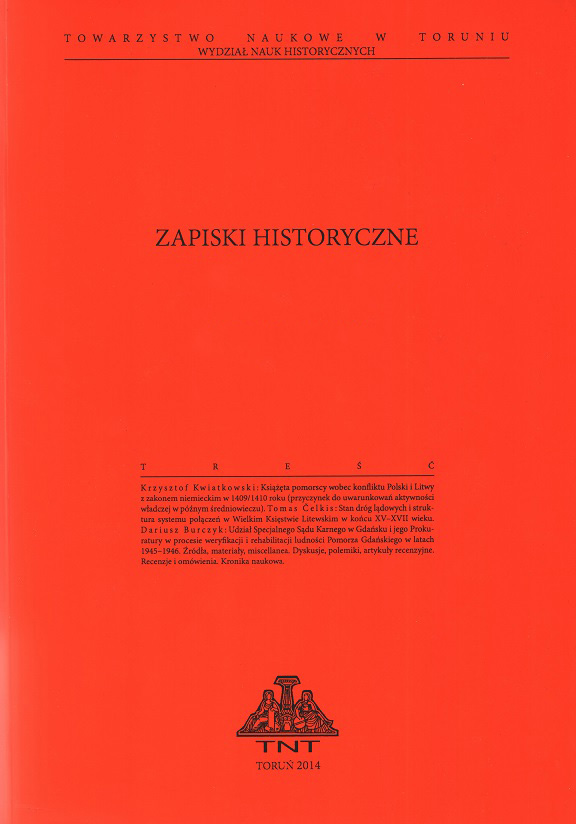
Keywords: Royal Prussia;Monastic Prussia;trade;credit;craft;correspondence;
Upon the decisions of the peace treaty concluding the Thirteen Years’ War between the German Order and the Kingdom of Poland supported by the Prussian estates, the monastic rule in Prussia was divided into two separate, if connected with each other, parts: Royal Prussia and Monastic Prussia. The article discusses economic relations – long distance trade, retail, the flow of people and capital between the biggest cities – Gdańsk and Königsberg in the years 1466-1525. In the older historiography there appeared information indicating that economic relations between Royal Prussia and Monastic Prussia were breached after the division of the Monastic State. Such information resulted from the insufficient database – the authors concentrated on the sources which addressed the problem in quantitative terms. On the basis of the analysis of the correspondence and scattered entries in the city books it is possible to establish that intensive trade and financial contacts between the biggest ports of Prussia were maintained. Trade relations concentrated on the exchange between Western Europe and Lithuania, where both cities played a major role. What prevailed was the export of salt, and at the beginning of the 16th century also the export of grain from Żuławy [Werder] to Königsberg. Wood, ash and hop played a major role in the import to the West. The exchange of goods invariably entailed the exchange of money and people. Inhabitants of Gdańsk and Königsberg lent money to each other and purchased property. The exchange of people was also visible; it referred mainly to journeymen and peddlers. The text shows that apart from customs books it is necessary to examine the correspondence while analyzing trade contacts of Gdańsk.
More...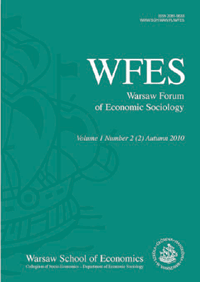
Keywords: Economic Change; Job Availability; Unemployment; Less-skilled Workers; Poverty
"How economic change affects job availability for less-skilled workers in Taiwan? Employment and earnings are the primary sources of support for most non-elderly adults. Thus, a key to understanding changes in the wellbeing of low-income populations is to understand the jobs and wages available to less-skilled workers. The macro-economy influences unemployment rates, wage shifts, and overall economic growth, all of which are important factors that determine the economic well-being of low-income families. This study is going to focus on the trends in labor market and macroeconomic circumstances that particularly affect less-educated and low-wage workers. We look at changes in work behavior among individuals by skill level and, then, examine unemployment and job availability. Secondly, the focus of this study is put on trends in earnings. We discuss the reasons behind substantial earnings shifts among lower-paid workers and higher-paid workers by gender since 1994. Moreover, we investigate the relationship between macroeconomic and labor market factors and poverty rates by using the vector autoregression (VAR) technique to analyze multivariate time-series data collected from 1978 to 2015. Finally, this study will discuss policy implications based on empirical results. Based on empirical evidence, we suggest that maintaining a high-employment economy and increasing skill levels for low-educated workers are important long-term solutions to the reduction of poverty in Taiwan."
More...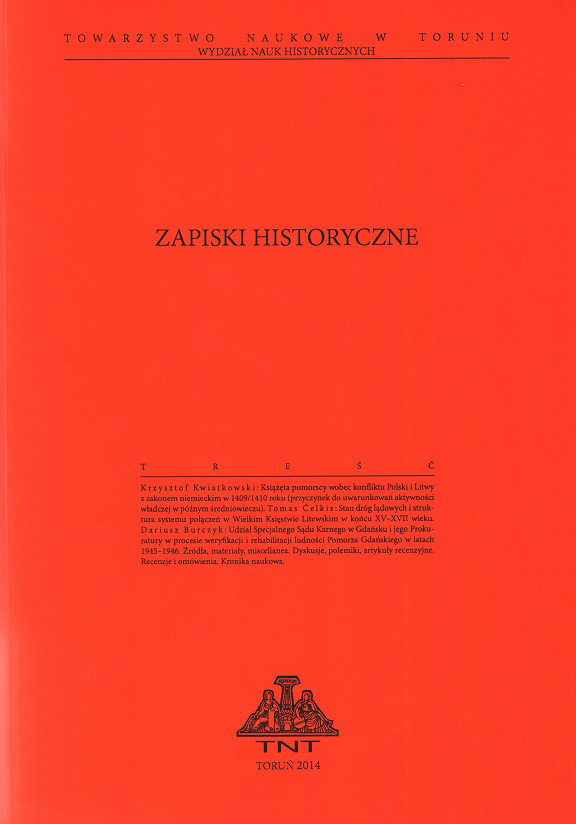
Keywords: the history of iconography;the representation of cities;perception of cities;pre-industrial city
The aim of the article is to present the material scope and methodological assumptions of the research on the image of cities undertaken since the late 1970s. The author points out that the image of the city is a very broad term in which various research directions are included. The subject matter had been addressed in the works of sociologists, geographers and art historians since the 1920s. The so-called cultural breakthrough in historical sciences in the 1970s has contributed to the increasing interest in the problem of the representation of cities. The essence of the new approach has become the interest in the principles of creating an image, the ways of its construction and its functions. The priority in undertaking new methodological challenges in the research on the perception of cities and its representations should be attributed to researchers of literature and art historians. Historians started to be more seriously interested in the area in the 1980s. According to the author, the studies developing until the beginning of the 21st century were characterized by a large methodological diversity. Over the last ten years, the focus of researchers has been the issue of creating an image of their own city in various research contexts: city representation, city branding, symbolic communication and communal staging.
More...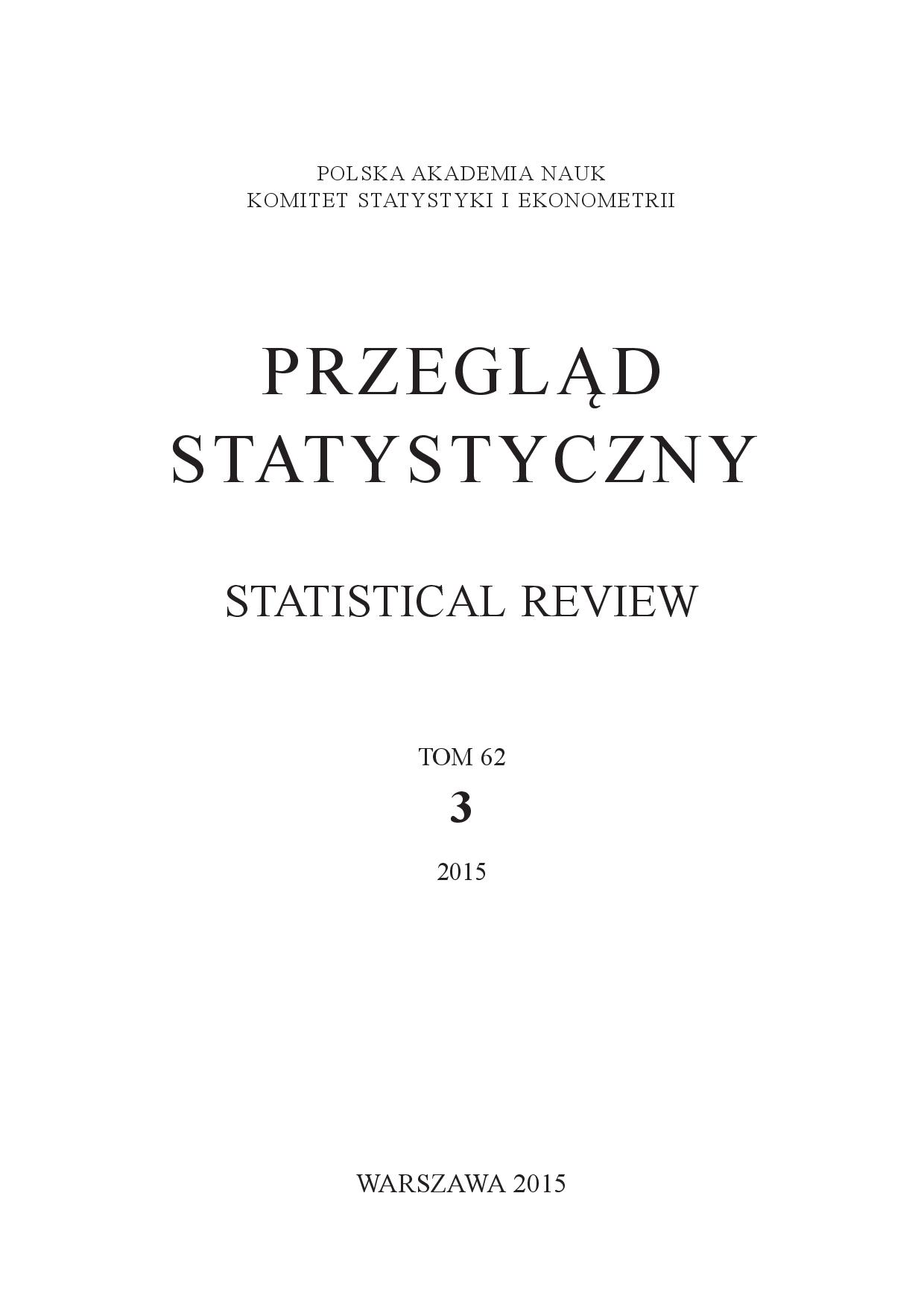
Keywords: equivalence scale; stochastic indifference; estimation; expenditure distribution
The paper presents the concept of the stochastic equivalence scale (SES), which is based on the stochastic indifference criterion. The SES is any function that transforms the expenditure distribution of a specific group of households in such a way that the resulting distribution is stochastically indifferent from the expenditure distribution of a reference group of households. The stochastic indifference criteria are also used in developing the method of the estimation of the SES. Non-parametric and parametric SESs are estimated using the Polish Household Budget Survey for the years 2005–2010.
More...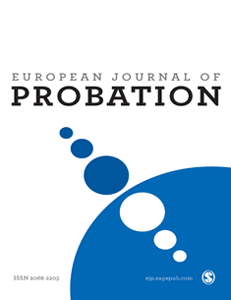
Keywords: Conditional release; England and Wales; parole;
This article is written as part of a special issue of the European Journal of Probation, which seeks not simply to describe and to critique ‘parole’ as it has evolved over time, but to focus on the justifications and the actors involved in parole decision-making and supervision. This article explores the changing face of ‘parole’ in England and Wales. The Parole Board today has little in common with the Parole Board of 1967. The characteristics of the prisoners who appear before panels of the Board have also changed. ‘Parole’ is now a very different process, no longer ‘early conditional release’, but what might better be described as ‘delayed conditional release’. This requires a fundamental re-analysis of its purpose and the justifications for its use.
More...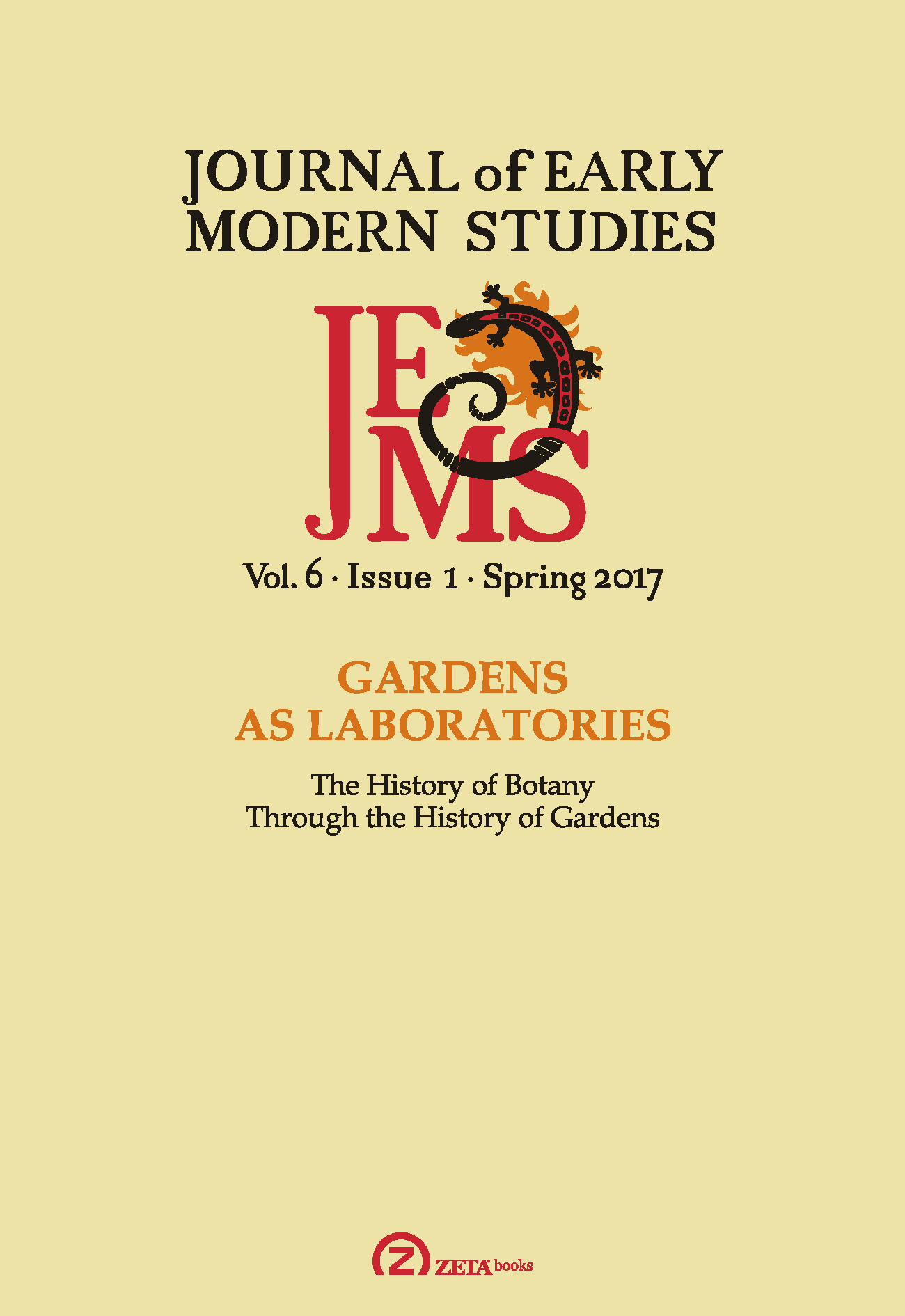
Keywords: herbarium; history of botany; Linnaeus; morphology; systematisation; botanical knowledge; archives
This paper focuses on the relationship between the compilation of a herbarium in early modern history and the search for a classification of nature. By looking at the histories of different herbaria and their compilers, this paper shows how the nature of ordering botanical materials changes along with the search for a system of ordering plant knowledge.
More...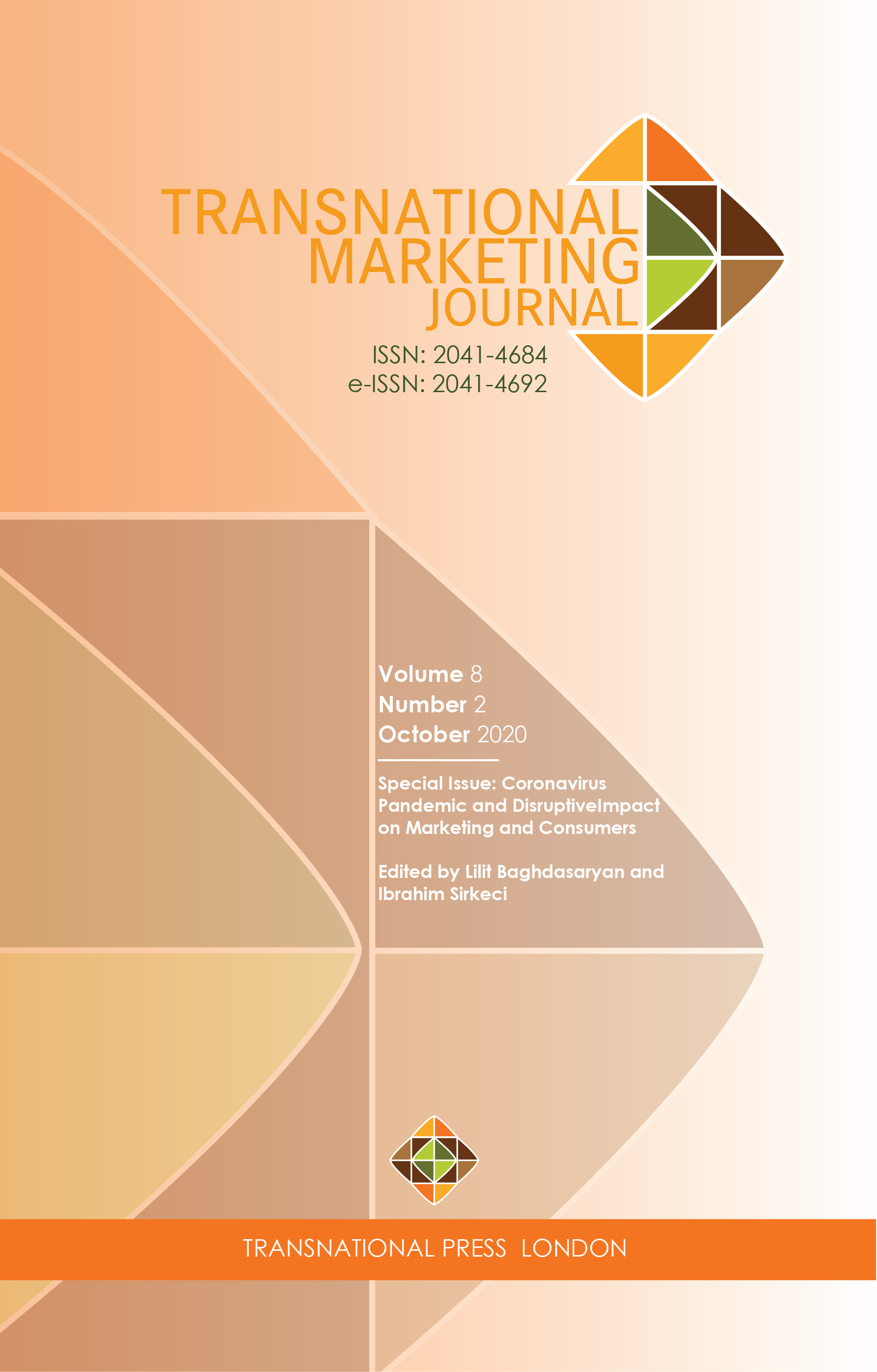
Keywords: utilitarian shopping value; hedonic shopping value; death threat; online purchase intention; COVID-19;
Consumer behaviour can change according to time and conditions. The hedonic and utilitarian values that evoke our sense of purchase can be effective in producing these differences. Specifically, consumers display purchasing activities with different values and behaviours when they feel insecure, such the feeling of a potential threat to their lives, such as during the current COVID-19 pandemic. The present cross-sectional study aims to investigate the effects of such a potential threat on online purchase intentions toward food products and whether hedonic and/or utilitarian shopping values play a mediating role in these relations during the current COVID-19 pandemic conditions in Turkey. More specifically, data was collected from 556 food consumers during April 2020 using an online survey. This study used a structural equation model to analyse and test the research hypotheses. The results show that a perceived potential threat to life (death threat) is positively related to both utilitarian versus hedonic shopping value and online purchase intentions toward food products. Also, utilitarian versus hedonic shopping values are positively related to a death threat with regard to food products. Utilitarian shopping and hedonic shopping values can play a mediating role between death threat and online purchase intentions. This demonstrates that a strong perceived threat to life, such as in the case of the COVID-19 pandemic or other high risk factors, will result in the intention to buy foods providing hedonic or utilitarian value, which promotes online shopping.
More...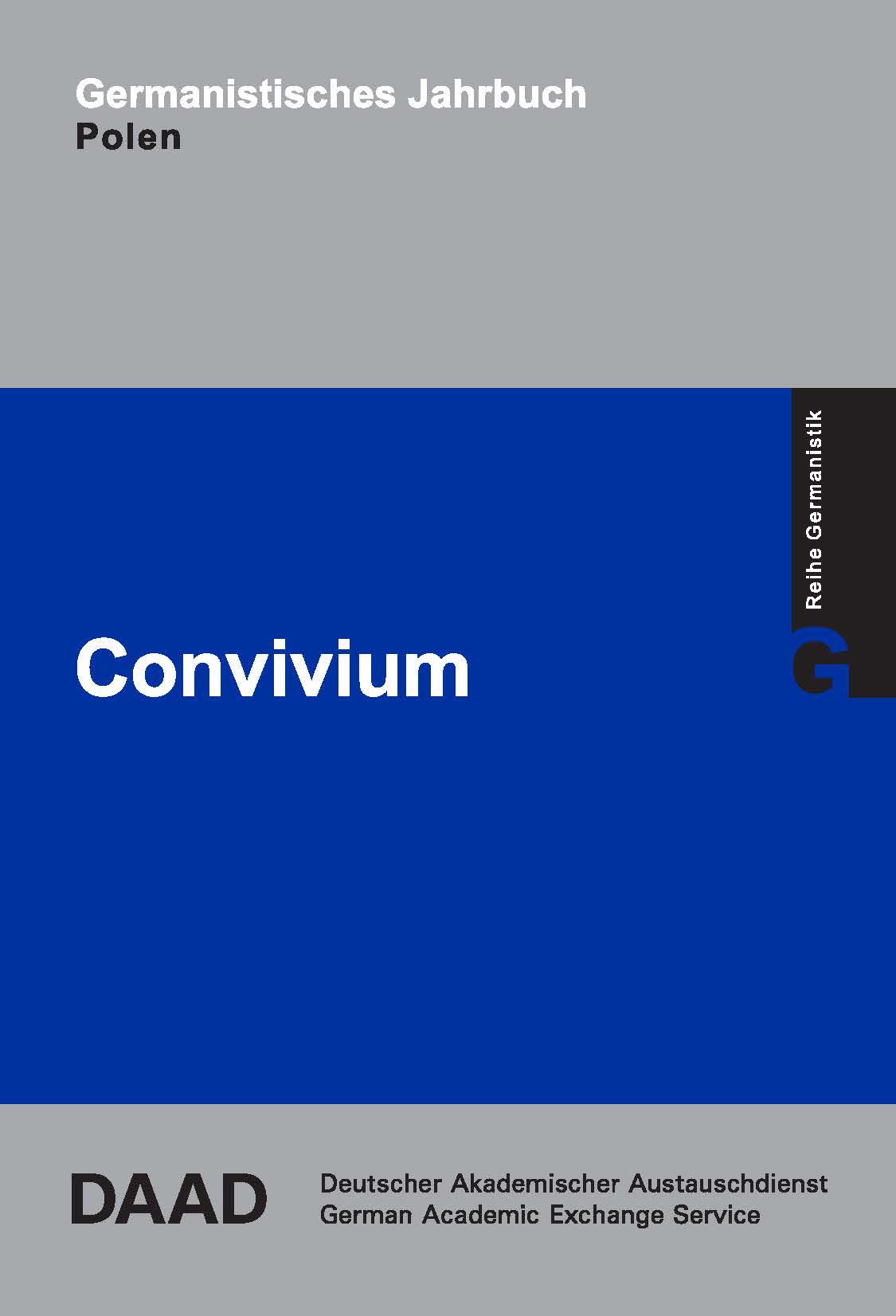
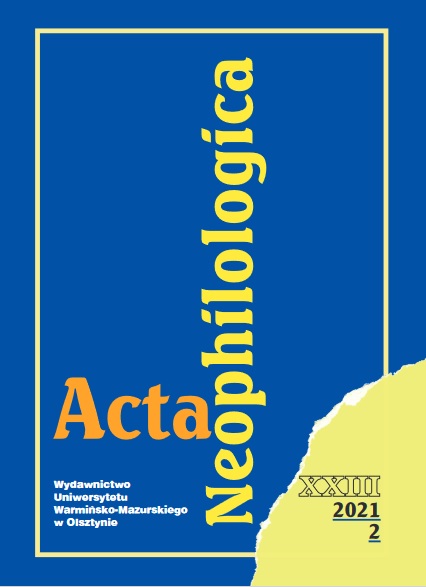
Keywords: text type; testament; will; history of language;Royal Prussia;
This article presents an attempt to show the specific features of the German legal language in the chosen wills of the nobility from Royal Prussia of the 17th century, in the area of German settlement in the East. The investigation aims to answer thequestion as to whether the examined testaments suit the pattern of the will as a text type. The author focuses on the graphemic, lexical and syntactic levels of the testament. The outline of structure and function of wills provides the background for such a defined research area.
More...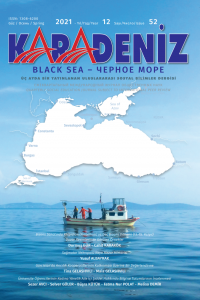
Keywords: Cyber loafing;organizational indifference; ethic values; personality traits; perception of organizational punishment;
In this study, it is aimed to examine the mediating role of organizational punishment perception in the relationship between extroversion and responsibility and ethical values, and cyberloafing and organizational indifference. The research was designed in relational screening model. The sample of the study consists of 786 teachers reached by simple random sampling method. A questionnaire form was used to collect data in the research. The questionnaire form consists of demographic information form, extraversion and responsibility dimensions of personality scale, ethical values scale, cyberloafing scale, organizational indifference scale and organizational punishment perception scale. Within the scope of the study, descriptive statistical analyzes, correlation analysis, and structural equation modeling were used. As a result of the analyzes, it has been determined that extraversion, responsibility and ethical values have negative and significant effects on cyberloafing and organizational indifference. In addition, it has been determined that the perception of organizational punishment has a partial mediator role in the relationship between responsibility and ethical values and organizational indifference.
More...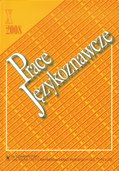
Keywords: onomastics; historical anthroponymy; linguistic influences
The aticle is devoted to Polish non-personal names
More...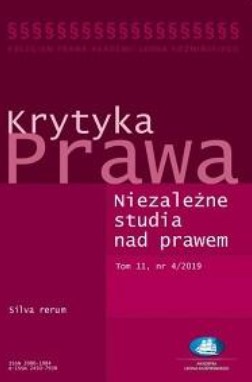
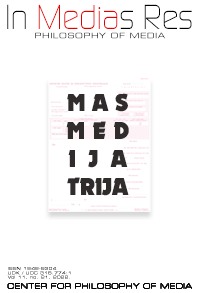
Keywords: spectacle; show; visual culture; culture of visualizations; critique of media;
In the proposed presentation we will concern ourselves with the relationship between popular science, contemporary culture and the new forms of daily life on the crossroads of historical development and the answer to the global health crisis that has pushed the social life into something that we will theme as our main thesis – the culture of visualizations. This culture itself is a part of techno-scientific development of the twentieth century from the so called technics of the observer and image science to the cyber-culture and so on. The contemporary state of affairs can not be critically understood on the basis of media theory that has been developed on the grounds of social theory and its critique of technology because the notion of existing relations between the real and the virtual, image and the world effectively disappears in the integral show of visualization.
More...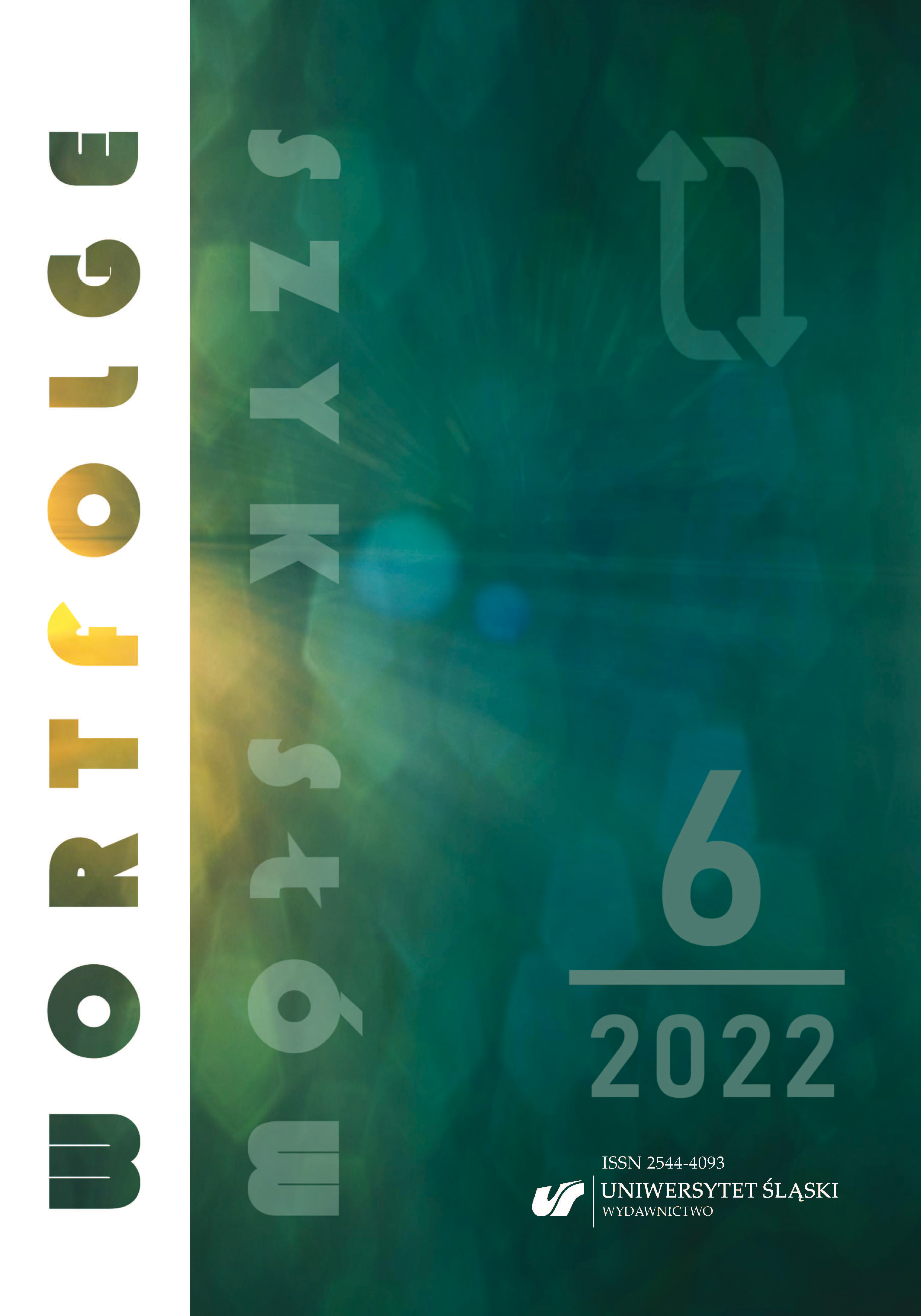
Keywords: discourse analysis; visualization; corpus; migration discourse; German as foreign language
The article deals with the question of how linguistic data obtained through discourse linguistic analyses are communicated outside linguistics. The focus is on the didactics of German as a foreign language, with a special focus on university German teacher training in Slovakia. It will be examined how the more recent disciplines such as discourse linguistics can be effectively integrated into the curriculum beyond classical linguistics. This requires an interdisciplinary perspective, which is offered here through the visualizations. Based on this background, case studies from the German and Slovakian migration discourse of 2015 will be used to show how optimized knowledge can be conveyed using visualizations, even across complex subject areas.
More...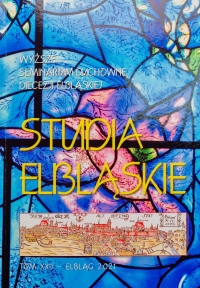
Keywords: reformation; Ducal Prussia; Royal Prussia; Lutheran art; architecture; church interior furnishings
The article presents the common roots of Protestant art in both parts of Prussia, sketching the process of taking over the material substance of the Roman Church by Catholic parishes transformed into Protestant parishes and then building new church buildings. This process took place in Royal Prussia under the control of the townspeople and in Ducal Prussia under the control of the nobility. The citizens, dominating in the part of Prussia mentioned the first of here, was also decisive in furnishing urban and domain churches, and it cared for the status quo of Lutheranism and Calvinism, especially during the decisive activities of the Counter--Reformation Polish nobility. At the same time, the townspeople and Protestant clergy had an intellectual influence on the iconography of the art in ecclesiastical and secular interiors. In the second part of Prussia, the seizure of power over church structures by the court of the Lutheranized prince Albrecht Hohenzollern and the nobility ruled out conflicts over churches with the Catholic hierarchy. At the same time, they allowed for direct control over parishes and churches, making the church interiors almost private family pantheons. The influence of the gentry limited the influence of the townspeople and the clergy on pictorial art, the message of which in the interiors of rural churches was almost limited to didactic content. In spite of the domination of catechetical content in both parts of Prussia, painting and emblematic decorations related to piety have also appeared.
More...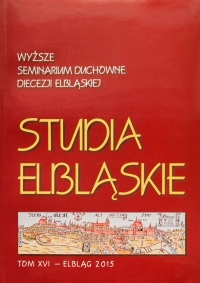
The year 2015 marks the fifth anniversary of the death of Fr. Henryk Jankowski, the „Solidarity” union chaplain who, while working in the parish enclosing the industrial areas of the City of Gdańsk, went with the pastoral service to the striking shipyard workers in August 1980. The article „Were Fr. Henryk Jankowski’s Travels the Realisation of his Charism?” presents the parish priest of St Bridget’s Church who read his vocation to the priesthood to the neighbours. It covers the period 1970 – 2010. At that time Fr. Jankowski performed responsibly his role as the parish priest and the chaplain of working people. During his not easy priestly service he often travelled outside the parish. Both on his business and private trips he established cordial contacts not only with the donors but primarily with the people in distress. The article is of a fragmentary, and not of an exhaustive character. The reflections on Fr. Jankowski, his activity are still present in the consciousnessof his former colleagues, friends and the other people who experienced his kindness. The publication has been developed on the basis of the archive and library materials, the press articles and the interviews with the people related to Fr. Jankowski. It is original and it has not been published before. The gathered material has permitted to divide the article into three relatively small chapters. In the first one the author has presented the profile of the protagonist. The second one has described his contacts in Poland, whereas the last one has been devoted to his foreign visits, his way of implementing the priestly charism. The article is based on the historical method applying the comparison of the documents from different sources.
More...